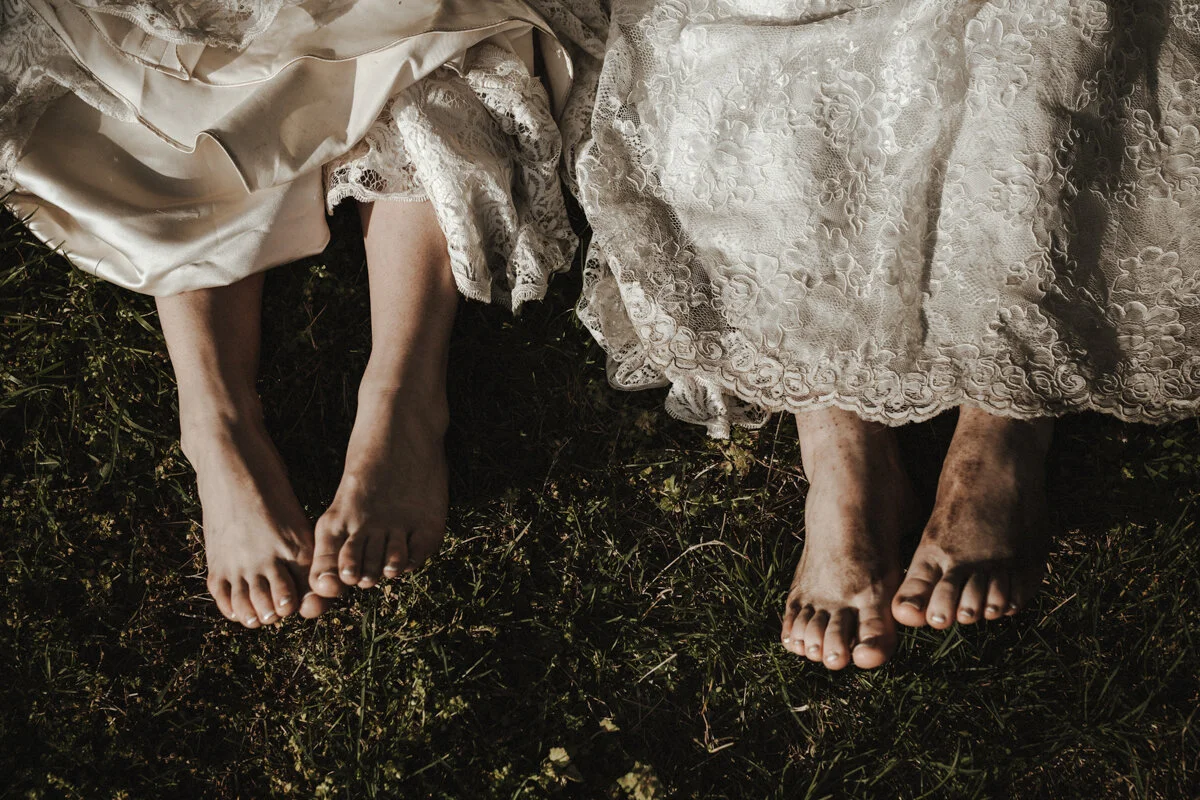Are Feminist Weddings a Myth?
/Photos by Carly Romeo & Co.
Emma Bedor and Catalyst Editor Liz Susong Debate the Concept of the Feminist Wedding
SO CAN WEDDINGS BE FEMINIST?
Emma says "No"
I am a feminist, and I am getting married. The two are not antithetical. I do not believe, however, that a wedding can be feminist, with “feminist” in adjective form. Today we use the term “wedding” to refer to both a marriage ceremony and the reception or party that often follows. But if we disentangle them we see that although a wedding itself cannot be feminist, it can indeed incorporate elements of resistance that are in line with feminist theory and practice.
Liz says "Yes"
I am the editor of Catalyst, and I attempted to have a feminist wedding. Feminism is a catch-all term for a political dialogue that is rooted in a critique of power being associated with ascribed characteristics (sex, race, etc.). Choosing a legal union makes a couple complicit in the state’s choice to assign rights and privileges based on marital status; however, weddings and marriages can challenge assumptions about power and therefore be feminist.
WEDDINGS ARE FULL OF CHOICES — THAT’S PRETTY FEMINIST ITSELF, RIGHT?
Emma says:
Feminism strives to provide a means for agency, the ability to make unencumbered choices, to those for whom it has been historically denied. But when it comes to weddings, agency is often set aside. There are generally two camps when it comes to the “choices” involved in weddings: those who insist that the wedding is the bride’s day and she is entitled to do whatever she wants, and those who insist that a wedding isn’t just about the bride’s desires, that she must keep the needs of others (family, guests, vendors) in mind. Brides, grooms, and those who don’t identify with either label are sometimes told — or simply feel — that their agentive desires must be compromised to satisfy others, often for financial reasons, though sometimes out of sensitivity.
Liz says:
Weddings are packed with choices, especially for the nontraditional couple who is seeking to make meaningful selections that communicate their egalitarian values to their community. Many of our readers are excited to share the ways they exercised resistance in their wedding choices (not wearing white, walking down the aisle alone, reading egalitarian vows, selecting socially conscious vendors, etc.). These choices are important because they communicate feminist values, educate guests, and reflect changing gender roles in our society.
TO HAVE A FEMINIST WEDDING, DO YOU JUST NEED TO GET RID OF ALL THOSE PESKY TRADITIONS THAT IMPLY A WOMAN IS PROPERTY?
Emma says:
In my upcoming wedding, I set aside the fact that I am uncomfortable being walked down the aisle because it comes from a tradition of property transfer in which a woman’s father literally gives her to her husband-to-be. It means more to me that, even on “my” day, I am sensitive to my mother’s desire to take that walk with me, not because of its historical connotation, but what it signifies to her in the present. Am I no longer a feminist because, even in this micro example, I am participating in a ritual that perpetuates the exchange of women, even though ideally I would not? Would it be any less feminist if a man were giving me away? Would it be even more feminist if I walked down the aisle alone? Or if I refused to walk down it, but instead rode in on a tortoise?
Liz says:
Having healthy, supportive communities is also in line with feminist values. Engaging in dialogue about your principles and actively listening to others’ priorities while standing your ground when necessary is a feminist process. Sometimes compromising for the collective contributes to the greater good. There’s (usually) no reason to burn bridges in the name of feminism.
SO, HOW DO YOU KNOW IF YOUR WEDDING IS FEMINIST ENOUGH?
Emma says:
Regarding the examples of ways to walk down the aisle, the differences are only incremental, and all still include the signifier of woman-as-property to varying degrees, but what I am suggesting is that while resisting oppression is central to feminism, resisting oppression is far different than abandoning oppressive traditions. Although riding in on a vertebrate presents a challenge to being given away by one’s father, it is only a variation on a theme. Variations, I fear, perpetuate judgment about what qualifies as “feminist,” “not feminist,” and “not feminist enough,” to the detriment of feminists—and feminism—everywhere.
Just as multiple feminisms emerged from the determination that feminism has historically been white, middle-class, heteronormative, and possible only for a particular group of women, there are so many forms that weddings now take that trying to determine how “feminist” one is or is not works to undo feminism’s advances by credentialing who can and cannot call herself a feminist based upon choices made on a singular day. Even though a wedding may be steeped in traditionalism, I don’t believe that makes it, the bride, or groom anti-feminist. Conversely, just because a wedding avoids “non-feminist” trappings (white dresses, being given away, bouquet tosses, and so forth) it doesn’t mean that the feminist credibility of the married persons increases. My concern is that preoccupation with feminism-as-resistance during one’s wedding fetishizes feminism as a commodity, a product or label that can be purchased, rather than a call to action.
Liz says:
When contemplating weddings, I think it is important to recall the concept of “cooperative nonconformity.” This term acknowledges the reality that while we all participate in cultural institutions (it’s nearly impossible to avoid them altogether), we can still choose not to conform to power structures when possible. In these little acts of resistance, we are putting feminism into action. Using the historically established model for a wedding ceremony, but redefining expected traditions is one way to resist from within.
Feminism is not limited to academic dialogue and political activism; “the personal is political,” so to speak. If a couple is consciously feminist while planning a wedding, their wedding (and more importantly, marriage) is an extension of their feminist values. It is unnecessary to quantify how feminist a wedding is because a wedding is one event in a feminist’s lifetime of participation in and resistance to societal events and institutions. The stories in this magazine reflect the breadth of this conversation; feminism takes many forms in the way people resist cultural expectations.
WHAT’S THE TAKE-AWAY?
Emma says:
Preoccupation with measuring feminism in weddings causes us to lose sight of what feminism is all about: freedom from oppression. I believe that feminism should not be acquired through a singular performance or purchase, otherwise it becomes aspirational, available only to a few, and again an adjective apt for cooptation. To me, this seems antithetical to feminism, a movement that should be open to all and everyone.
When I imagine my wedding, I am not concerned whether others will perceive my day—or me—as feminist, feminist enough, or not-at-all feminist. But at the end of the day, this feminist is okay with that.
Liz says:
If feminism is upheld exclusively as a lofty ideal, rather than a praxis that is incorporated into our everyday lives, it becomes inaccessible to the average citizen who chooses to resist in meaningful ways when marrying, child-rearing, voting, working, consuming, etc. Assuming that weddings occur outside of the boundaries of feminism due to the history and politics of marriage is short-sighted. Many feminists choose to marry, and therefore, it is unsurprising that a feminist dialogue is taking place around weddings. There are many industries and cultural institutions in need of a feminist disruption; Catalyst is just one place where individuals are wrestling with societal norms, sentimentality, and egalitarian convictions. The wedding industry maintains some very traditional notions of gender roles, consumerism, and beauty norms, and we say bring on the feminist critique!
This article originally appeared in Volume Two of Catalyst Wedding Magazine.
Liz Susong is the Editor of Catalyst. She's a transient adventurer who can call anywhere home as long as there is a good wifi connection.
Emma Bedor is a PhD Candidate in Communication Studies at the University of Minnesota, where she examines popular culture, health, illness, feminism, & media. She is very excited about her own upcoming wedding.
























